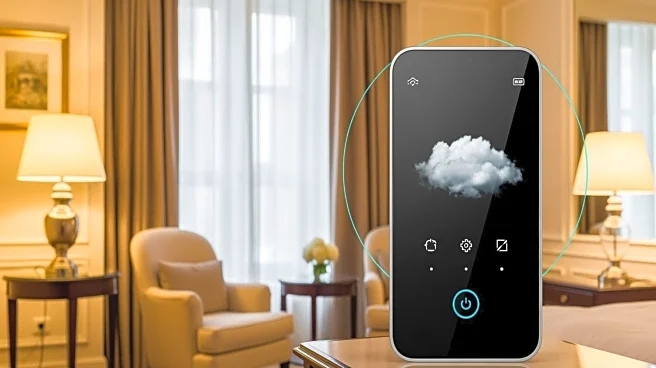What's Happening?
The hospitality industry is increasingly adopting cloud-based smart thermostats to improve energy management solutions (EMS) and enhance guest comfort. Traditional smart thermostats, which operate on 'If
This, Then That' logic, are being replaced by cloud-connected systems that leverage artificial intelligence (AI) and machine learning. These advancements allow for more dynamic and predictive energy management, enabling hotels to optimize operations and energy savings. By moving complex calculations to the cloud, hotels can deploy simpler, less expensive devices in rooms while utilizing the cloud's computational power for real-time analysis and decision-making. This shift is particularly beneficial in regions with dynamic energy pricing, such as those served by PG&E, where energy costs vary by time and season.
Why It's Important?
The transition to cloud-based smart thermostats represents a significant shift in how hotels manage energy consumption and guest comfort. By leveraging AI and machine learning, hotels can achieve greater energy efficiency and cost savings, which is crucial in an industry with tight margins. This technology allows for real-time optimization of energy use, reducing costs during peak pricing periods and enhancing guest experiences through more personalized climate control. The move to cloud-based systems also aligns with broader trends in the hospitality industry towards digital transformation and sustainability, as hotels seek to reduce their carbon footprint and improve operational efficiency.
What's Next?
As the hospitality industry continues to adopt cloud-based EMS solutions, further advancements in AI and machine learning are expected to enhance these systems' capabilities. Hotels may increasingly rely on predictive analytics to anticipate guest needs and optimize energy use, potentially leading to new standards in energy management. Additionally, as more properties implement these systems, there may be increased collaboration with utility providers to develop tailored energy solutions that maximize savings and sustainability. The ongoing development of cloud-based EMS technology is likely to drive further innovation in the hospitality sector, with potential applications extending beyond energy management to other areas of hotel operations.
Beyond the Headlines
The shift to cloud-based smart thermostats also raises questions about data privacy and security, as these systems rely on network connectivity and data sharing. Hotels must ensure robust cybersecurity measures are in place to protect guest information and maintain trust. Furthermore, the integration of AI and machine learning in energy management may lead to ethical considerations regarding the use of predictive analytics and automated decision-making in hospitality settings. As these technologies become more prevalent, industry stakeholders will need to address these challenges to ensure responsible and sustainable implementation.










